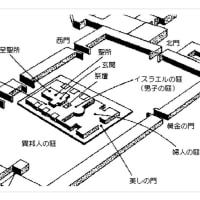46章 押し流された神
1.ヘブル語とギリシア語聖書
ヘブル語聖書をギリシア語に翻訳したと言われる70人訳聖書では、この章以降は、25章に挿入されています。また、エレミヤの預言は、そもそも44章で終わっています。ですから、46章以降のエレミヤ書の位置づけについては、様々に議論されてきました。
ただ46章から51章は、ユダ南王国に対する預言というよりも諸外国に対する神の裁きを語っています。ですから、ヨシヤ王からゼデキヤ王まで、つまりバビロンによるエルサレム陥落に至るユダとエルサレムに対する預言が、ひとまず終わったところで、ヘブル語の聖書のように直ぐバビロン捕囚の預言にはいかず、ギリシア語翻訳聖書のように諸外国に対する裁きが語られたということもありうるのでしょう。しかしどちらが、エレミヤが書いた本来のオリジナルに近いのかは、よくわかっていないのです。
2.エジプトに向けた神のことば
ともあれ46章ではエジプトに向けて神のことばが語られています。2節によるとこれが歴史上も名高いカルケミシュの戦いについての預言であることがわかります。エジプト軍は、この戦いでバビロンに破れ、逆に侵略の危機にさらされていきます(後半13節以降)。
聖書はイスラエルの歴史を中心に描いていますが、それは、イスラエルが、神に選ばれた民であり、この選ばれた民をとおして、神ご自身の全世界に対する救いの計画が知らされるためです。神はイスラエルだけの神ではないということです。神は全世界の神です。もともと、神の救いの計画は全世界に向けられたものであるし、神は全世界の民を愛しておられる、天地万物、万国の主なのです。ですから当然、他の諸国に対する神のみこころも語られることになります。
8節、この時、「彼は言った」とあります。彼はエジプトの王ファラオ・ネコを指します。バビロン軍に向かって突進するエジプト軍の力強さを、氾濫し逆巻くナイル川にたとえています。しかし、神はそれを「かわいい雌の子牛」に過ぎないと言います(20節)。興味深いのは、新改訳が「押し流された」と訳している箇所です(15節)。ヘブル語本文では「ニスハフ」、「逃げ去る」ですが、70人訳聖書では「ニスハフ」を「ナス・ハフ」と分けて読み、「なぜハフ(雄牛神アピス)は押し流されたのか」と訳しています。雌の子牛エジプトを置き去りにして押し流された雄牛に注目させています。古代近東の考えでは、一国の征服は必然的にその守護神を打ち破ることになります。ですから、ここは、エジプトが拠り頼んだ神の無力さとその敗北を風刺しているのです。
こうして読んでみると、エジプトに対するエレミヤのメッセージも、基本的にはイスラエルに語っているものと同じです。イスラエルには、まことの神をのみ認め、その神に仕えよと言います。エジプトに対しても同じ、神々と拝まれるべきものはたくさんあるけれども、拝むのであるならば、まことの神を拝みなさい、ということです。そして、エジプトが神の懲らしめを受けても、それで終わりなのではなく、回復されることを伝えています(26節)。となると、27節のヤコブ、イスラエルという呼びかけは、民族的な意味ではなく、霊的な意味で使われていると考えられます。つまりエジプト人であれ、イスラエル人であれ、まことの神に立ち返る者を、神はご自分の選びの民、特別な存在として扱ってくださるということです。
日本には、様々な偶像があります。山の神、海の神、様々なものが拝まれています。おみくじや占いを宗教行動と考えると、それらを好んで行う人も含めた宗教人口は、日本の総人口の約70%と言われます。大切なのは、信じられるものはたくさんあるけれども、その中でも、唯一まことの神を信じる、ということでしょう。では今日も良き一日となるように祈ります。
<クイズコーナー>
最初に、昨日のクイズです。古代イスラエル人にとって、東側はどのような位置として理解されていたでしょうか?①前方、②後方。答えは、①前方です。日の出る方が前方という考え方から、ヘブル語のケデム「前、前面」やその変化形の単語も東を示す語として頻繁に用いられています。では、今日の聖書クイズです。カルケミシュの戦いに向かうエジプト軍を阻止しようとして、殺された王様は誰でしょうか?①アモン、②ヨシヤ、③エホヤキン、答えはまた明日。では今日も良き一日であるように祈ります。
Chapter 46: God Pushed Away
1. the hebrew and greek bibles
In the translation of the Bible of the Septuagint, which is said to be a translation of the Hebrew Bible into Greek, this chapter and the following ones are inserted in chapter 25. Also, Jeremiah's prophecy ends in chapter 44. Therefore, the position of the book of Jeremiah after chapter 46 has been debated in various ways.
However, chapters 46-51 are not a prophecy against the southern kingdom of Judah, but rather God's judgment against foreign nations. Therefore, it is possible that the prophecies against Judah and Jerusalem from King Josiah to King Zedekiah, i.e., leading up to the fall of Jerusalem by Babylon, have come to an end, and the prophecies do not go immediately to the Babylonian captivity as in the Hebrew Bible, but instead speak of judgment against other nations as in the Greek translation of the Bible. It is possible, though. It is not clear, however, which of the two is closer to Jeremiah's original writing.
2. the word of God to Egypt
In chapter 46, God's word is addressed to Egypt, and verse 2 indicates that this is a prophecy about the famous battle of Carchemish, which is also known in history. The Egyptian army was defeated by Babylon in this battle, and conversely, was threatened with invasion (vv. 13 onward).
The Bible focuses on the history of Israel because Israel is God's chosen people, and through this chosen people, God's own plan of salvation for the whole world is made known. God is not the God of Israel alone. God is the God of the whole world. Originally, God's plan of salvation was for the whole world, and God is the Lord of heaven and earth and of all nations, who loves all the peoples of the world. Therefore, naturally, God's will for the other nations will also be spoken.
In verse 8, it says, "He said. He refers to Pharaoh Neco, king of Egypt. The strength of the Egyptian army rushing toward the Babylonian army is compared to the flooding and swirling Nile River. But God says it is nothing more than "a lovely female calf" (v. 20). It is interesting to note that the Shinkai-yaku 2017 translates "swept away" (v. 15). The Hebrew text reads "nish-haf," "flee away," but the Septuagint reads "nish-haf" separately as "nas-haf" and translates it as "Why was Haf (the bull god Apis) swept away? It draws attention to the bull that was pushed away, leaving the female calf Egypt behind. In ancient Near Eastern thought, the conquest of a country inevitably meant overthrowing its patron god. So here is a satire on the impotence of the God on whom Egypt depended and its defeat.
Jeremiah's message to Egypt is basically the same as the message to Israel. He tells Israel to acknowledge and serve only the true God. The same is true for Egypt: there are many gods and many things to be worshipped, but if you are going to worship them, worship the true God. He then tells us that even though Egypt has suffered God's chastisement, it is not the end of the story, but will be restored (v. 26).
Then, the call to Jacob and Israel in verse 27 is not used in an ethnic sense, but in a spiritual sense. In other words, God treats those who turn to the true God, be they Egyptians or Israelites, as His chosen people, as special beings. He says, “Do not be afraid, Jacob my servant; do not be dismayed, Israel. I will surely save you out of a distant place, your descendants from the land of their exile. Jacob will again have peace and security, and no one will make him afraid.
In Japan, there are many idols. Mountain gods, sea gods, and many other things are worshipped. If we consider omikuji and fortune-telling as religious behaviors, the religious population, including those who prefer them, is said to be about 70% of the total population of Japan.
What is important, I think, is the awareness that religion is not a comforting or superstitious belief. It is something that reveals the condition of the human soul and encourages repentance.
The recent conflicts are a painful reminder. And behind some of them, there are clashes between religions and religions.However, I believe that religion is originally meant to reveal the condition of the human soul, which causes wars, in other words, to make people clearly aware that there is a spirit of strife in their hearts, to encourage them to repent, and to live in love.I really hope that the words of the Bible will be understood correctly and that we will be people who live in the love of God that the Bible speaks of.
<Quiz Corner
First, yesterday's quiz. For the ancient Israelites, what position was the east side understood as? (1) Front, (2) Back. The answer is (1) forward. The Hebrew word kedem, "front, front," and its variants are also frequently used to indicate the east, based on the idea that the one from which the sun rises is the front. Now for today's Bible quiz. Which king was killed while trying to stop the Egyptian army heading for the battle of Carchemish? (1) Amon, (2) Josiah, (3) Jehoiachin, and the answer will be given tomorrow. Well, I wish you a good day today.
















